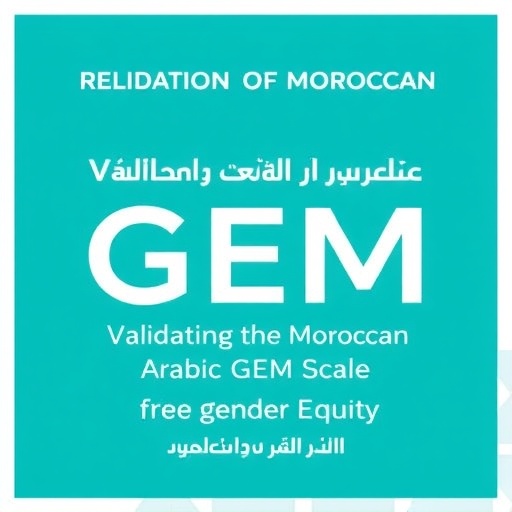A recent study has surfaced from the realm of social psychology, shedding light on the critical need for gender equity in varying cultural contexts. This research presents a thorough examination of the Moroccan Arabic version of the Gender Equitable Men (GEM) scale, known as MA-GEM. As societal norms evolve and the push for gender equality intensifies, the importance of culturally adaptable assessment tools cannot be overstated. The research expands upon the original GEM scale—designed to measure attitudes towards gender equity among men—by validating its adaptation for Moroccan Arabic speakers.
The adaptation process of the GEM scale is rooted in the idea that effective measurement tools must resonate with the cultural nuances of the populations they seek to assess. In Morocco, a country characterized by rich cultural diversity and complex gender relationships, the challenges of ensuring gender equity are multifaceted. Traditional gender roles often impede progress, making it essential to understand men’s attitudes towards gender equality in order to foster effective change. The research team, comprising Ouahid, Mansoury, Khachay, and colleagues, embarked on this significant endeavor to ensure that the GEM scale would be both linguistically and culturally attuned to the Moroccan context.
Given the efficacy of the GEM scale as a measurement tool in other cultural settings, the researchers adhered to rigorous methodologies to ensure that the Moroccan adaptation would yield valid and reliable results. The study employed a comprehensive cross-cultural validation strategy, which required not merely translation but a profound understanding of the sociocultural intricacies that influence gender perceptions in Morocco. This involved iterative rounds of feedback and testing with local focus groups, ensuring that the MA-GEM scale was both linguistically accurate and relevant to the local context.
The implications of the MA-GEM validation extend far beyond the academic world; they touch on grassroots movements working tirelessly for gender justice in Morocco. By equipping local advocates and researchers with a culturally relevant measurement tool, the potential for data-driven advocacy increases significantly. The study elucidates how understanding the underlying attitudes of men towards gender equality can inform targeted interventions that aim to shift these perspectives, thus driving societal transformation.
In a country where gender norms are deeply entrenched, the MA-GEM scale serves as more than just a research tool; it embodies hope for a future where men actively participate in and promote gender equality. The research findings underscore the necessity of engaging men in conversations about gender roles, as their attitudes are pivotal to addressing systemic inequalities. This requires ongoing education and awareness initiatives that challenge traditional mindsets, paving the way for a more equitable society.
Moreover, the research highlights the influence of language in shaping societal attitudes towards gender. The MA-GEM scale provides insights not only into men’s perceptions of gender roles but also into how language functions as a vehicle for cultural expression and socialization. The intricate relationship between language and gender attitudes emphasizes the need for culturally specific frameworks that can effectively address gender issues in diverse global contexts.
Aside from its contribution to gender studies, the MA-GEM scale stands to illuminate the broader discourse surrounding cross-cultural research methodologies. As globalization continues to weave its threads through various societal fabrics, there emerges an urgent need for evaluation tools that are adaptable to different cultural frameworks. This research exemplifies best practices for cross-cultural adaptation, serving as a potential model for future studies in other regions of the world.
Furthermore, the launch of the MA-GEM scale signifies a proactive step towards fostering discussions about masculinity and its evolving roles in contemporary Moroccan society. As men grapple with changing societal expectations, the findings from this study can aid in the development of educational programs that promote healthier expressions of masculinity. By framing gender equity as an inclusive movement, the MA-GEM scale encourages men to redefine their identities in ways that contribute to collective wellbeing.
However, the validation of the MA-GEM scale is just the beginning. The researchers emphasize that continued investigation is required to monitor how gender attitudes evolve over time and within specific initiatives. Action-oriented research that harnesses the insights provided by the MA-GEM will be crucial in tracking progress and identifying resistance points in the journey towards gender equity.
In summary, the cross-cultural adaptation and validation of the Moroccan Arabic version of the GEM scale represent a significant milestone in both academic and activist circles. The research reinforces the concept that gender equity is not just a Western import but a universal aspiration that resonates within the fabric of Moroccan culture. As this conversation around gender roles expands, it invites broader engagement from all spheres of society—innovators, educators, policymakers, and everyday individuals alike.
The extensive efforts put into this validation process advocate for the importance of culturally informed research practices that honor local contexts. The advancement of gender equity is a journey necessitating the participation of diverse voices, underscoring that true progress is achieved when all members of society are actively involved in the conversation. The MA-GEM scale thus offers an invaluable resource for understanding and ultimately reshaping societal norms about gender roles in Morocco.
In light of the awareness raised by this study, it contributes to an ongoing global dialogue about the role of men in gender equity and demonstrates the potential for local adaptations of research instruments to incite meaningful change. With the MA-GEM scale now operationalized, the pathway is laid for transformative efforts aimed at dismantling barriers to gender equity, empowering a new generation of advocates inspired to drive the movement forward.
Subject of Research: Gender equitable men’s attitudes in Morocco through the MA-GEM scale.
Article Title: Cross-cultural adaptation and validation of the Moroccan Arabic version of the gender equitable men (GEM) scale (MA-GEM).
Article References:
Ouahid, H., Mansoury, O., Khachay, F.e. et al. Cross-cultural adaptation and validation of the Moroccan Arabic version of the gender equitable men (GEM) scale (MA-GEM).
Discov Psychol 5, 114 (2025). https://doi.org/10.1007/s44202-025-00485-7
Image Credits: AI Generated
DOI: 10.1007/s44202-025-00485-7
Keywords: gender equity, Morocco, GEM scale, MA-GEM, cross-cultural adaptation, masculinity, attitudes.




